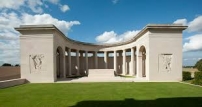| First Name: | Albert James | Last Name: | SULLY | |
|---|---|---|---|---|
| Date of Death: | 20/11/1917 | Lived/Born In: | Haggerston | |
| Rank: | Private | Unit: | Royal West Kent6 | |
| Memorial Site: | Cambrai Memorial, Louverval, France | |||
Current Information:Age-20 419, Hackney Road, Haggerston
The Battle of Cambrai This was a major British offensive on the Western Front that was launched on 20th November, 1917 and lasted through to the beginning of December. As the name suggests it was an attack towards the city of Cambrai and the important German railhead there, which it was hoped would be captured. The battle was notable for two things: the massed use of tanks for the first time and the success of the first day’s fighting when the formidable Hindenburg Line was breached and gains of five miles were made in places. In celebration the church bells throughout Britain were rung. However this success was short lived. The tanks were not reliable and the German defence stiffened as the fighting progressed and when they counter attacked in force on 30th November, the British came under so much pressure that they were forced to withdraw from many of the positions they had captured earlier on. Both sides suffered around 45,000 casualties during the course of the fighting. On the opening day of Cambrai, 20th November, 1917, 12th Division attacked on the extreme right of the battle front. 35 and 36 Brigades led the attack and when they had secured their objectives, which included the villages of La Vacquerie and Banteux as well as parts of the Hindenburg Line, 37 Brigade moved forward and shortly after 9am continued the attack with 7th East Surrey in the vanguard. Assisted by the accompanying tanks they had soon gained their objective, the Hindenburg Support Line, at which point 6th East Kent (Buffs) passed through their line to continue the attack. They were followed in turn by 6th Royal West Kent and 6th Royal West Surrey (Queens) who had the task of of forming the defensive flank on the right, which they succeeded in doing. As they advanced, 6th Royal West Kent discovered the enemy holding out in Le Quennet Farm and although some of them succeeded in entering the farm they were all killed or captured. It had been a successful operation but not with out cost. Among the casualties suffered by 6th Royal West Kent was Albert Sully who was killed in action. |
||||
| « Back to Search Results | ||||
| If you think any of the information shown here is incorrect, Click Here to submit your amends and comments | ||||




